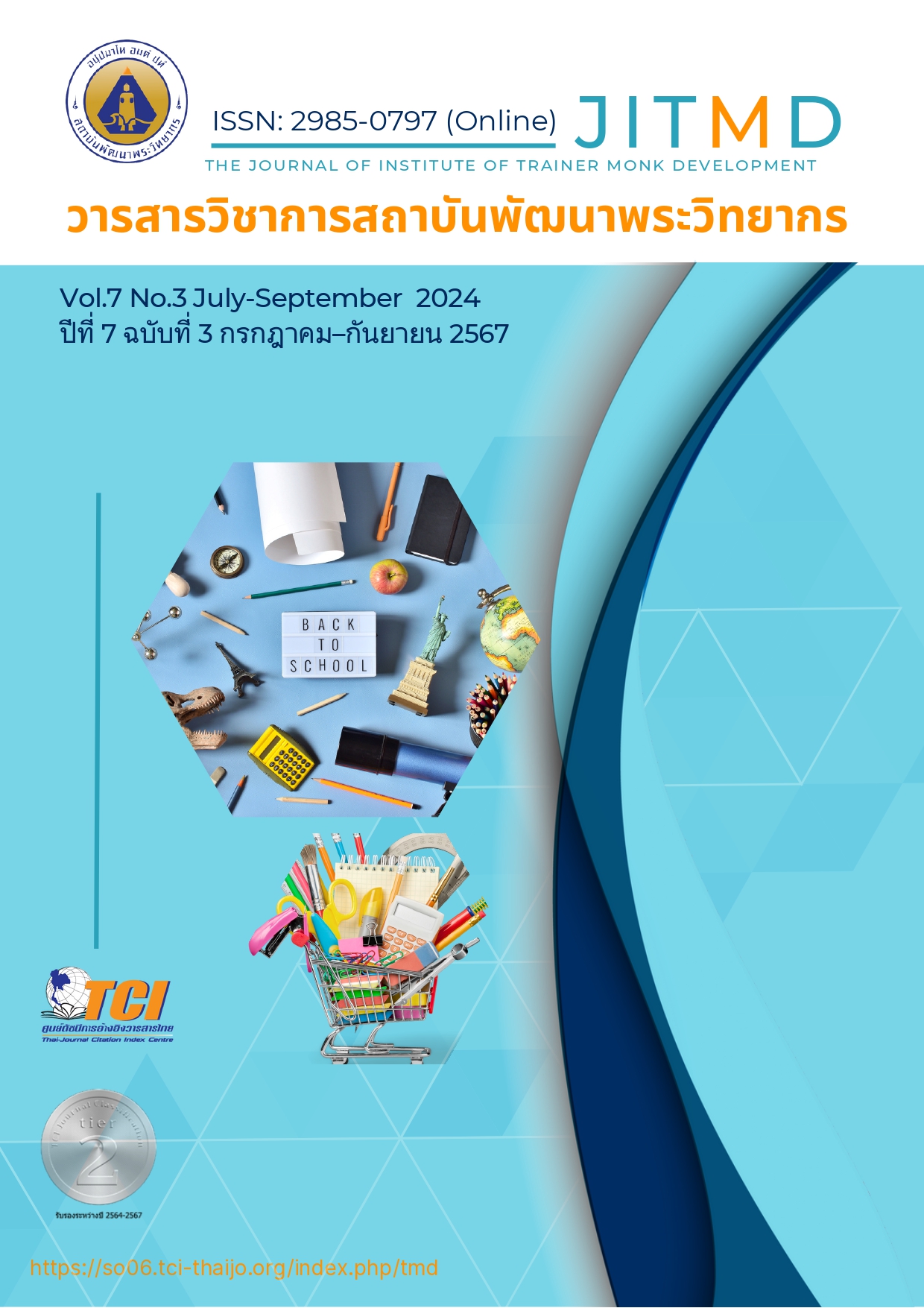Super Leadership of Administrators Affecting Building Team Effectiveness of Teachers Under Nakhon Pathom Primary Educational Service Area Office 2
Main Article Content
Abstract
The research aimed to: 1) study the level of super leadership of school administrators; 2) study the level of building the team effectiveness of teachers; and 3) analyze super leadership of school administrators affecting building the team effectiveness of teachers under the Nakhon Pathom Primary Educational Service Area Office 2. The sample was 286 government teachers in schools under the Nakhon Pathom Primary Educational Service Area Office 2, derived by proportional stratified random sampling distributed by district. The research instrument used was a questionnaire. Statistics used for data analysis were frequency, percentage, mean, standard deviation, and stepwise multiple regression analysis. The research results were as follows: 1) Overall super leadership of school administrators was at a high level. There were 2 aspects that consists of self-goal orientating and self-leadership preparation, at a highest level. There were 3 aspects that consists of self-development, empowerment, and creating leaders, at a high level, respectively. 2) Overall building the team effectiveness of teachers was at a high level. There was 1 aspect, sharing goals, at a highest level. There were 8 aspects that consists of interpersonal relations, work participation, mutual respect, sharing communication, developing skills and knowledge, creative development, motivation, and benevolent leadership, at a high level, respectively., and 3) The super leadership of school administrators in the aspects of self-development (X5), self-leadership preparation (X1), empowerment (X3) and self-goal orientating (X4) were factors affecting building team effectiveness of teachers (Ytot) and they collectively predicted building team effectiveness of teachers at the percentage of 63.80 with significant statical level of 0.5. The regression equation was tot = 0.64 + 0.34 (X5) + 0.21 (X1) + 0.18 (X3) + 0.13 (X4).
Article Details

This work is licensed under a Creative Commons Attribution-NonCommercial-NoDerivatives 4.0 International License.
บทความที่ได้รับการตีพิมพ์เป็นลิขสิทธิ์ของวารสารวิชาการสถาบันพัฒนาพระวิทยากร
ข้อความที่ปรากฎอยู่ในบทความที่ได้รับการตีพิมพ์ในวารสาร ถือเป็นความรับผิดชอบของผู้เขียนบทความ และข้อคิดเห็นนั้นไม่ถือว่าเป็นทัศนะและความรับผิดชอบของกองบรรณาธิการวารสารวิชาการสถาบันพัฒนาพระวิทยากร
References
กระทรวงศึกษาธิการ. (2560). นโยบายปีงบประมาณ พ.ศ. 2560 สำนักงานคณะกรรมการการศึกษาขั้นพื้นฐาน. กรุงเทพฯ: สำนักงานคณะกรรมการการศึกษาขั้นพื้นฐาน.
เกรียงศักดิ์ เจริญวงศ์ศักดิ์. (2561). Super Leadership: สุดยอดภาวะผู้นำ. พิมพ์ครั้งที่ 3. กรุงเทพฯ: ซัคเซส พับลิชชิ่ง.
ธัญญ์นภัส มณีพันธุ์วงศ์. (2564). ภาวะผู้นำเหนือผู้นำของผู้บริหารสถานศึกษาที่ส่งผลต่อสมรรถนะของครูไทยในทศวรรษที่ 21 สังกัดสำนักงานเขตพื้นที่การศึกษาประถมศึกษานครปฐม เขต 1. วิทยานิพนธ์ครุศาสตรมหาบัณฑิต สาขาวิชาการบริหารการศึกษา. บัณฑิตวิทยาลัย มหาวิทยาลัยราชภัฏนครปฐม.
พิชญาภา ยืนยาว. (2561). ผู้นำเหนือผู้นำของผู้บริหารการศึกษา. Veridian E-Journal Silpakorn University ฉบับภาษาไทย สาขามนุษยศาสตร์ สังคมศาสตร์ และศิลปะ, 11(1), หน้า2886-2899.
วาสุชา เพชรกานต์. (2564). การสร้างทีมงานที่มีประสิทธิภาพของผู้บริหารโรงเรียนขยายโอกาสจังหวัดสงขลา. วิทยานิพนธ์ศึกษาศาสตรมหาบัณฑิต สาขาวิชาการบริหารการศึกษา. บัณฑิตวิทยาลัย มหาวิทยาลัยหาดใหญ่.
สายใจ ชูฤทธิ์. (2561). การศึกษาภาวะผู้นำเหนือผู้นำของผู้บริหารสถานศึกษาตามการรับรู้ของครูสังกัดสำนักงานเขตพื้นที่การศึกษาประถมศึกษากระบี่. วิทยานิพนธ์ครุศาสตรมหาบัณฑิต สาขาวิชาการบริหารการศึกษา. บัณฑิตวิทยาลัย มหาวิทยาลัยราชภัฏสุราษฎร์ธานี.
สํานักงานเขตพื้นที่การศึกษาประถมศึกษานครปฐม เขต 2. (2565). แผนปฏิบัติการประจําปีงบประมาณ 2565. นครปฐม: สํานักงานเขตพื้นที่การศึกษาประถมศึกษานครปฐม เขต 2.
สำนักงานคณะกรรมการข้าราชการพลเรือน. (2559). การสร้างทีมงานที่มีประสิทธิภาพ. กรุงเทพฯ: สำนักงานคณะกรรมการข้าราชการพลเรือน.
สํานักงานเลขาธิการสภาการศึกษา. (2560). แผนการศึกษาแห่งชาติ พ.ศ. 2560 - 2579. กรุงเทพฯ: พริกหวานกราฟฟิค.
เสวียน เจนเขว้า. (2564). ภาวะผู้นำที่สร้างได้. วารสารวิชาการ สถาบันวิทยาการจัดการแห่งแปซิฟิค, 7(2), หน้า 35-45.
Levi, D. (2011). Group dynamics for teams. 3rd ed. California: Jossey-Bass.


